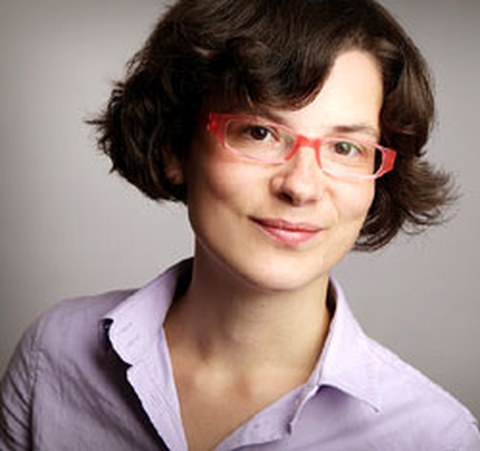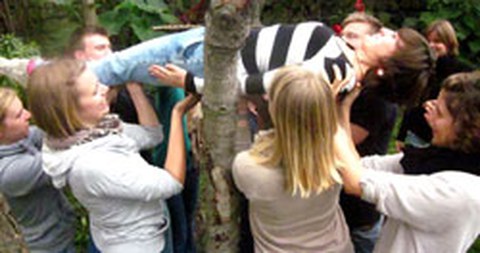Opening the language treasure trove
(Interview from 2011)
Dagmar Möbius
When this issue of the alumni magazine comes out, it will be midsummer for Maria Rodriguez Elizondo. She will be in Colombia and Argentina giving seminars on behalf of "kulturweit," the volunteer program of the German Foreign Office and German Commission for UNESCO.

Maria Rodriguez Elizondo is currently giving seminars in Latin America.
So, she’ll be working. Still, the 30-year-old says that she is "in a period of revitalization for what feels like six to ten months." In September 2011, she completed a Magister degree in German Studies/German as a Foreign Language and Romance Studies/Linguistics, earning top grades. She had already studied for five years at TU Dresden after high school to become a teacher of German and Spanish.
So why does a young woman with a name like hers want to study Spanish? Maria Rodriguez Elizondo laughs. "I always wanted to learn Spanish." Cue more confusion. "My father is from Cuba, but I didn't grow up with him," she explains.
Studying in Dresden was the only option for her. "I didn't even apply anywhere else, I wasn't ready for that then," she smiles. She liked the range of courses on offer. Elizondo has happy memories of studying Middle High German: "Die Nibelungen, for example, fascinated me – like a lot of things you don't need later in life." Still, the first few semesters were no walk in the park. "You had to put in a lot of effort and learn how to manage your time. Education, psychology, Spanish, literature and linguistics – goodness, it was such a long time long ago." She laughs. At some point, she starting finding German more difficult than Spanish, something she is almost a little surprised about herself.
She was confronted with a very different culture at the Universidad de Sevilla, where she spent two semesters from 2003 to 2004. While students in Germany have a certain freedom in their decisions, in Spain, the teacher is the authority. There were some practical problems right at the beginning: "Do I take notes in German or Spanish?" To get to know people, she played volleyball and got involved in a social project for the homeless.
Maria Rodriguez Elizondo sees her long period of study as a plus. "I needed the time to find out what I enjoyed doing," she reasons. She argues that, for personal development, you need to learn to take responsibility for yourself and to focus on your interests. "If you want to know something, you have to take it upon yourself to go to the lecturer and ask."
She has particularly fond memories of Professor Susanne Narciss at TUD’s Institute of Educational and Developmental Psychology. Professor Narciss taught her how to motivate students – in simulated lessons that were vivid and true-to-life. Elizondo also liked the "Bewegte Schule" ("school in motion") concept. No wonder, with her enthusiasm for dance. Without focusing on any one specific style. "When I dance, I am 100 percent MYSELF," she says of her experience. That dance could someday be part of her work is conceivable. "Dance is such an immediate form of expressing yourself," says the talented linguist – who, by the way, is not only fluent in German, English and Spanish, but also speaks Brazilian Portuguese at a B1 level and Czech at an A2 level. Latin and French lessons at school seemed such a given to her that she doesn't even mention them on her resume. She learned that language has a lot to do with emotion from Gesine Lenore Schiewer, who taught translation studies/intercultural German studies at TUD as a visiting professor.
"You can't take yourself too seriously as a teacher," says Maria Rodriguez Elizondo. In her view, you need to explain to learners why they are doing what they are doing. She already has extensive teaching experience. For example, she has taught German as a foreign language to children and teens from abroad or whose families come from abroad at the Hülße-Gymnasium and Bertolt-Brecht-Gymnasium high schools in Dresden and to students in intercultural German classes at TUD. She has also developed an intercultural teaching unit on studying in Germany for a language school in Buenos Aires.

"kulturweit" volunteers on a team-building exercise in Bogotá, Colombia, in November 2011.
Two years ago, the linguist could not have imagined that she would one day work as a coach in intercultural adult education. "I didn't even know it was a profession until then," she smiles. Yet she had already tutored on the TUDIAS international summer courses and run events for prospective students at German schools in Buenos Aires. She has been a coach with "kulturweit" for almost two years, and since July 2010 she has worked with the European voluntary service at Internationales Bildungszentrum Witzenhausen (IBZW). In that role, she develops educational training programs for volunteers from Germany and Europe. There was never a dream job for her. But now she has one. That's what she says as she raves about her seminar work. She has a knack for teaching, people often tell her. "True," she says, "it's something I can do."
Where would she like to go one day? "I struggle to look into the future," she admits, "some things come at you and others happen if you make them." A healthy balance between work and free time is important to her. She likes to be creative. "Maybe dance could be integrated into language work?" she muses. Or teacher training? "I could also see myself doing a decent job of that at some point, too," Maria Rodriguez Elizondo laughs. However, she believes that to develop your own teaching persona, you need to break free from old teaching patterns and try out your own teaching style. Or maybe she'll start a doctorate. To explore questions such as "how do people who speak multiple languages feel, and how do they feel when they switch languages?" Multilingualism and identity is a field she would like to continue exploring.
"I've opened up the treasure trove; now I need to delve deeper," she concludes.
Contact:
Maria Rodriguez Elizondo
Tel.: +49 176-60895624
Email: Maria R. Elizondo
